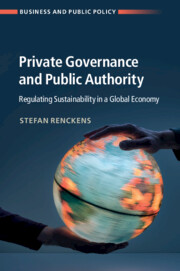Private Governance and Public Authority
At a time of significant concern about the sustainability of the global economy, businesses are eager to display responsible corporate practices. While rulemaking for these practices was once the prerogative of states, businesses and civil society actors are increasingly engaged in creating private rulemaking instruments, such as eco-labeling and certification schemes, to govern corporate behavior. When does a public authority intervene in such private governance and reassert the primacy of public policy? Renckens develops a new theory of public-private regulatory interactions and argues that when and how a public authority intervenes in private governance depends on the economic benefits to domestic producers that such intervention generates and the degree of fragmentation of private governance schemes. Drawing on European Union policymaking on organic agriculture, biofuels, fisheries, and fair trade, he exposes the political-economic conflicts between private and public rule makers and the strategic nature of regulating sustainability in a global economy.
- Provides a new theory of public interventions in private governance
- Opens up a new research agenda on lobbying and interest representation by private governance schemes
- Shows empirically that public policymakers in a diverse set of issue areas have been monitoring private governance ever since its early development, with an eye on possibly intervening
Reviews & endorsements
'Stefan Rencken’s ground-breaking analysis is the most comprehensive yet of why and when governments intervene in private environmental governance. Theoretically rich, and offering deep insights into regulatory interventions in fisheries, organic agriculture, biofuels, and fair trade schemes in the European Union, it is a seminal investigation of this increasingly important trend in global governance.' Peter Dauvergne, Professor of International Relations, University of British Columbia
'This book demonstrates why Stefan Renckens has quickly become one of the significant scholars in the arena of global governance. Many people have struggled to conceptualize the tensions and complementarities between public and private regulation. Renckens explores an area that has been overlooked - why and how governments step in to regulate the private regulatory systems. He includes a novel treatment of private governance systems as actors that lobby for their own interests. The argument is tested against four cases of private governance in the European Union, exploring variation in EU intervention. This book deepens our understanding of the relationship between private and public governance in global markets.' Virginia Haufler, Associate Professor, Department of Government and Politics, University of Maryland
'As a dizzying number of products are being labeled as sustainable or fair, some observers have hoped that governments will step in to reduce the confusion. Stefan Renckens has produced a compelling account of when governments are likely to intervene or stay on the sidelines, based on a study of EU policymaking and with broad implications for the study of private governance.' Tim Bartley, Professor of Sociology, Washington University in St. Louis, and author of Rules without Rights: Land, Labor, and Private Authority in the Global Economy
Product details
March 2020Adobe eBook Reader
9781108801799
0 pages
2 b/w illus. 12 tables
This ISBN is for an eBook version which is distributed on our behalf by a third party.
Table of Contents
- 1. Introduction: public-private governance interactions
- 2. Explaining public interventions in private governance
- 3. Organic agriculture
- 4. Biofuels
- 5. Fair trade
- 6. Fisheries
- 7. Evaluating public interventions in private governance
- Appendix. Interviews
- Endnotes
- References
- Index.







